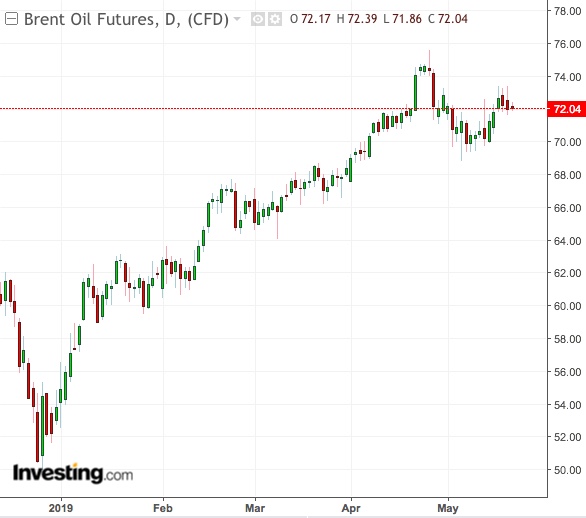If the price action that came at first was worthy of a champagne pop, it’s also because the initial messaging was just as sparkling for its unity and coherence.
Saudi Energy Minister Khalid Falih, concluding the OPEC+ preliminary meeting in Jeddah, said the Kingdom had no plans to raise oil production for now, and might not hike it for the rest of the year either. To be sure, the Jeddah meeting wasn’t supposed to yield a decision on anything. Yet Falih’s Russian counterpart Alexander Novak fell in line with him, agreeing it was too soon to talk about ending the cuts that had been on for six months. UAE Energy Minister Suhail al-Mazrouei chipped in, saying OPEC’s job “is not done yet” and relaxing cuts was not “the right decision”.
The combined effect of the soundbites from the three ministers on the energy media’s airwaves delivered a $1.20 spike to a barrel of Brent in Monday’s early trade in Singapore, sending oil bulls into bouts of glee.
Russia Clearly Has Different Ideas On Output Hikes
But the celebrations wouldn’t last. In fact, they would unravel in a matter of hours. Leaving the room of the Jeddah meeting, Novak would tell a different story to Bloomberg TV that seemed designed to please his boss, Russian leader Vladimir Putin, more than Falih—who had been counting on him as his most trusted ally outside of OPEC for the past three years.
OPEC+ may need "to tweak" the current production deal when it meets next month, Novak told Bloomberg TV. One option on the table is "removing the over-compliance" with current targets, he said, a move that would effectively ease output cuts in the second half of the year.
Bloomberg built out its interview with Novak into a news story that read like a semi-opinion piece, asserting that Putin might want a say too in OPEC+ policy. At the annual St. Petersburg International Economic Forum (SPIEF) in June last year, Putin said Russia "wasn’t interested in an endless rise in the price of energy and oil", Bloomberg reminded its readers.
The 2019 edition of SPIEF is scheduled for June 6 to June 8—and again the Russians appear happy with an oil price somewhat lower than the Saudis prefer. Moscow can live with $60 a barrel, while Riyadh struggles with anything less than $80, it said.
Bloomberg added that Russia has merely cut its supply as required, meeting its official target only this month. So removing the over-compliance will mean Moscow stays exactly where it is today. The powerful Russian oil industry, led by Kremlin power-broker and Rosneft PJSC Chief Executive Officer Igor Sechin, wants to be able to boost output.
That brings us to the question: will OPEC be able to stay consistent on its messaging till the more important June 25-26 meeting that will decide what the 14-member cartel and its 10 allies do with production in the second half of the year?
Increasingly Hard For Saudis To Force Their Decision On All
John Kilduff, founding partner at New York energy hedge fund Again Capital, told Investing.com in a recent interview that it’ll be increasingly hard for Riyadh to force its decision on all oil producers—except, of course, the UAE and a few others in OPEC that were happy to let Saudi authority, rather than their own autonomy, speak.

Said Kilduff:
“Short of sending up smoke signals, the Russians couldn’t have made it clearer that they would like to raise production once crude prices got above a certain point, and the consensus is that Brent at above $70 would be that point.”
He added:
“I foresee much difficulty for the Saudis to cut supplies unilaterally without support from the Russians, as everyone else will be enjoying shipping more barrels at the Saudis’ expense.”
In an interview with CNBC on Monday, Novak said the oil market was “very unstable”, and that made it more difficult to set long-term policy. He pointed particularly to the sanctions against Iran that had set off dangerous escalations in the region, and the U.S.-China trade war, which could weigh down the global economy.
That brings us to another question: will Riyadh, on its own, be able to withstand global pressure—most notably, from U.S. President Donald Trump—to hike output?
Saudis' Wish For OPEC Consensus May Force Their Hand On Hikes
Kilduff believes the answer to that depends on how much the Saudis want to keep alive the portrayal that democracy is alive in OPEC and that it isn't a one-man club. He said:
“The Saudis want to give the impression that there’s still unity within OPEC. But how can they possibly win any backing from a key partner like Iran, when the enmity between the two have gotten to such a horrid level?.”
“And the Saudis have only themselves to blame for that by backing the U.S. sanctions against Iran.”
In its Monday piece, Bloomberg reminded the market that just a year ago, at another preliminary OPEC+ meeting in Jeddah, Falih resorted to similar tough talk that he won’t raise output.
Yet, under pressure from both Trump and Putin, he made a U-turn—and could do it again.
